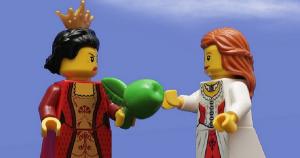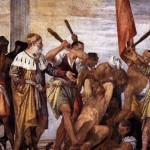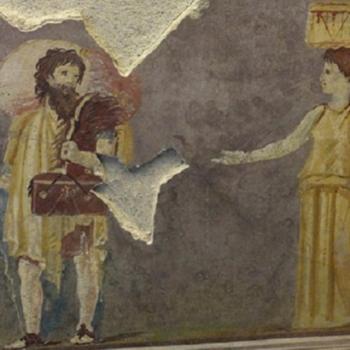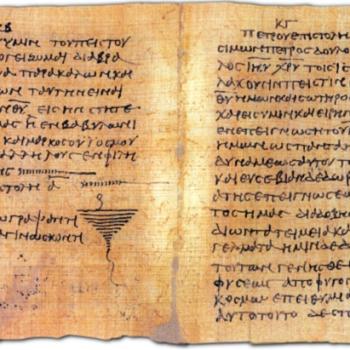History, or hogwash? Does it matter whether anything in the Bible really and truly happened? Or can fairy tales do just as good a job of inspiring faith? Did historicity matter to the ancient world? Should it matter to us?
We are told that the ancient world did not care about the distinction between truth and fiction. On the contrary, numerous ancient authorities insisted on the same accuracy as modern historians do. Cicero writes (De Oratore 2.62-63), “For who does not know history’s first law to be that one must not dare to tell falsehoods? And from there, that one must dare (to speak) nothing but facts? That there must be no suspicion of favoritism in one’s writing? Nor of enmity?”

Polybius declares that the historian’s duty is “to record totally according to the truth of what was done and said, no matter what kinds of events may have happened” (Histories 2.56.10). Polybius declares some writers to be “plausible liars” (axiopistōs pseudomenoi – 3.33.17). In his City of God, Augustine constantly cites the pagan Roman historian Varro, who makes clear distinctions between fabulosa and mythica versus historica. The connotation of mythos was so bad that Plato insists (Timaeus 26e 4-5) that Atlantis is “not a made-up story” (plasthenta mython) but a true account (alēthinon logon).
Ephoros (early 200’s BCE) displays a modern critical approach to history when he writes, “On contemporary events, we regard as most believable those who give the most detailed account; on the events in the distant past, however, we consider such an account wholly implausible, on the grounds that it is unlikely that all actions and most speeches would be remembered over so long a period of time.”
Lucian (early 200’s AD) declares in How to Write History 7-10, “History cannot admit a lie, even a tiny one, any more than the windpipe…can tolerate anything entering it in swallowing.” While he argues that liberty with facts is absolute (akratos) in poetry, he says the rules are different with history: “So this is a great, or rather a hyper-mega [sic] evil, if someone does not know how to separate the things of history and the things of poetry, but introduces into history the embellishments of the other: myth and eulogy and the exaggerations in these.” In fact, he warns, if “you sweeten (hēdynēs, “season, spice”) history beyond measure with myths (mythois) and praises,” you’ll be sorry!
But what do we think today? Does it matter whether Jesus has risen, or is still in the ground? Does it matter whether the Exodus really happened, or whether Solomon’s empire really existed? Does it matter whether stories such as Jonah or Esther are fiction or fact? I have published my thoughts in a three-part series entitled “Historicity: Does It Matter?” in the Presbyterian Outlook, starting with Part One: https://pres-outlook.org/2009/07/historicity-does-it-matter/. (The other two parts: http://pres-outlook.org/2009/07/historicity-does-it-matter-part-2-2/ and https://pres-outlook.org/2009/08/historicity-does-it-matter-part-3/.) Here are some points to consider from what I wrote in that series.
Some stories lose their value if they are found to be fiction. Heads usually roll at the news department when this happens. One Pulitzer Prize winning journalist lost her prize for a fictional story she wrote, presented as fact. But some stories do not need any historical fact to be of great value. Can fiction be a legitimate vehicle for faith? Yes! Jesus almost certainly made up his parables. The Good Samaritan, the Prodigal Son, the Chronicles of Narnia, Star Wars, and Orwell’s 1984 all give us truth in the form of fiction.
What’s the difference between the resurrection of Jesus of Nazareth, and the resurrection of Mr. Spock of the Starship Enterprise? Fiction lacks the compelling note of realism that meaningful faith requires. Mundane fact trumps even the most exciting fiction. A real-life cure for AIDS means more than even the most inspiring tale that never really happened. A fictional Esther has much less power to inspire us than a real Persian queen who really did take her life in her hands to save her nation from genocide.
Now, it doesn’t matter whether the events told in Jesus’ parables really happened. But it does matter, to me, whether they really come from Jesus. Authenticity of authorship matters in Christianity more than in any other faith, because it matters tremendously whether the words of Jesus truly come from him, or were fraudulently attributed to him. If 2 Peter turns out to be a shameless forgery, we should throw it in the garbage, because the writer claims to be an eyewitness of Jesus’ transfiguration, and insists that he is not publishing “cleverly devised myths” (2 Peter 1:16-18).
The Law of Moses loses a degree of credibility if its laws were created out of thin air by priests 500-800 years after Moses. The cries of the poor or the imperative to do justice are more easily ignored if they come in the form of fairy tales purporting to be fact.
The bottom line: Historical referent is our only check against pure subjectivity. And it is historical referent that sets Christian faith in a class by itself from all the other faith stories on the market. Facts make all the difference as we seek to figure out where to place our faith.
Have you noticed lately? All of a sudden, our modern world has gone from “truth is whatever is true for you,” to self-appointed “fact-checkers” who demand that you accept their claims as undisputed facts for all. We can welcome this surprising development. Now, we can have an honest debate about truth, if we can overcome their technological agenda-driven dominance over people’s access to the facts.
Will the great information monopolists of today’s world manage to bury the truth with “hate speech” policing and algorithms? John 1:5 gives us a promise that we must ultimately take on faith: “The light shines in the darkness, and the darkness has not overcome it.”
Truth matters! And historicity is a major component of truth.












